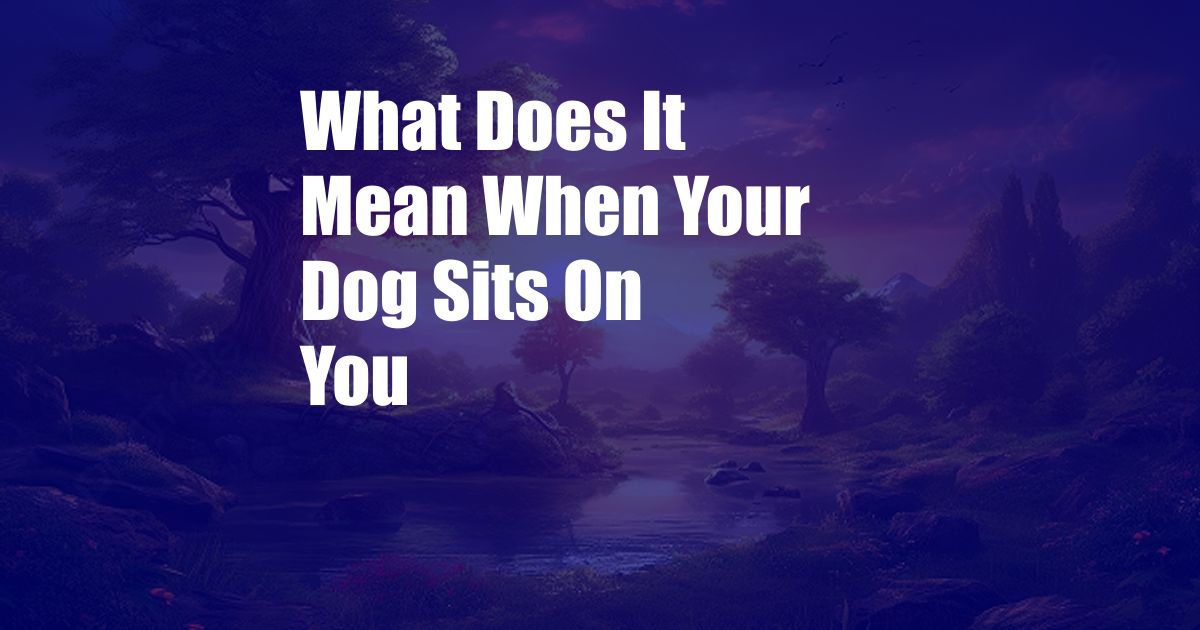
Why Does My Dog Sit on Me?
It’s a common sight in many households: a dog curled up on its owner’s lap or chest, seemingly content to sit there for hours. But what does it mean when your dog sits on you? Is it a sign of affection, dominance, or something else? In this article, we will explore the different reasons why dogs sit on their owners and provide tips on how to handle this behavior.
Is It a Sign of Affection?
One of the most common reasons why dogs sit on their owners is to show affection. When a dog sits on you, it’s essentially saying, “I love you and I want to be close to you.” This behavior is often accompanied by other signs of affection, such as licking, nuzzling, or wagging the tail.
Is It a Sign of Dominance?
While sitting on someone can be a sign of affection, it can also be a sign of dominance. This is especially true if the dog is sitting on you in a forceful or aggressive manner. If your dog is growling, snapping, or mounting you while sitting on you, it’s important to seek professional help as this behavior can be a sign of aggression.
Other Reasons
In addition to affection and dominance, there are a number of other reasons why dogs sit on their owners. These include:
- Comfort: Dogs may sit on their owners to seek comfort and warmth. This is especially common in cold weather or when the dog is feeling anxious or stressed.
- Attention: Some dogs sit on their owners to get attention. If you give your dog attention when it sits on you, it will learn that this behavior is a way to get your attention.
- Security: Dogs may sit on their owners to feel safe and secure. This is especially common in puppies or dogs that have been through traumatic experiences.
How to Handle the Behavior
If you don’t mind your dog sitting on you, then there’s no need to do anything. However, if you find the behavior to be annoying or uncomfortable, there are a few things you can do to discourage it.
- Ignore the behavior: When your dog sits on you, the best thing to do is to ignore it. Don’t give it any attention or reinforcement. Eventually, the dog will learn that sitting on you is not a way to get attention.
- Move away: If your dog sits on you, you can simply move away. This will show the dog that you’re not willing to tolerate the behavior.
- Create a designated spot: Some dogs like to sit on their owners because they don’t have a comfortable place to sit elsewhere. Providing your dog with a comfortable bed or crate will give it a place to go when it wants to sit down.
- Use a command: You can also train your dog to sit on its own spot by using a command. Once your dog knows the command, you can use it to tell it to sit on its own spot when it tries to sit on you.
Frequently Asked Questions
- Why does my dog sit on my chest? Dogs often sit on their owners’ chests because it’s a warm and comfortable place to be. It also allows them to be close to their owners’ faces, which is important for bonding.
- Why does my dog sit on me when I’m on the toilet? Some dogs sit on their owners when they’re on the toilet because they’re curious about what their owners are doing. They may also be trying to protect their owners from perceived danger.
- Is it OK to let my dog sit on me? Whether or not it’s OK to let your dog sit on you is a personal preference. If you enjoy having your dog sit on you, then there’s no harm in it. However, if you find the behavior to be annoying or uncomfortable, you can take steps to discourage it.
Conclusion
There are many reasons why dogs sit on their owners. It can be a sign of affection, dominance, comfort, attention, or security. If you don’t mind your dog sitting on you, then there’s no need to do anything. However, if you find the behavior to be annoying or uncomfortable, there are a few things you can do to discourage it.
Would you like to know more about your dog’s behavior? Leave a comment below and we’ll be happy to answer your questions.